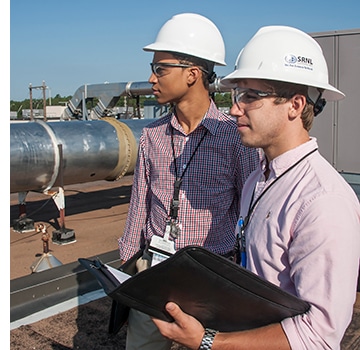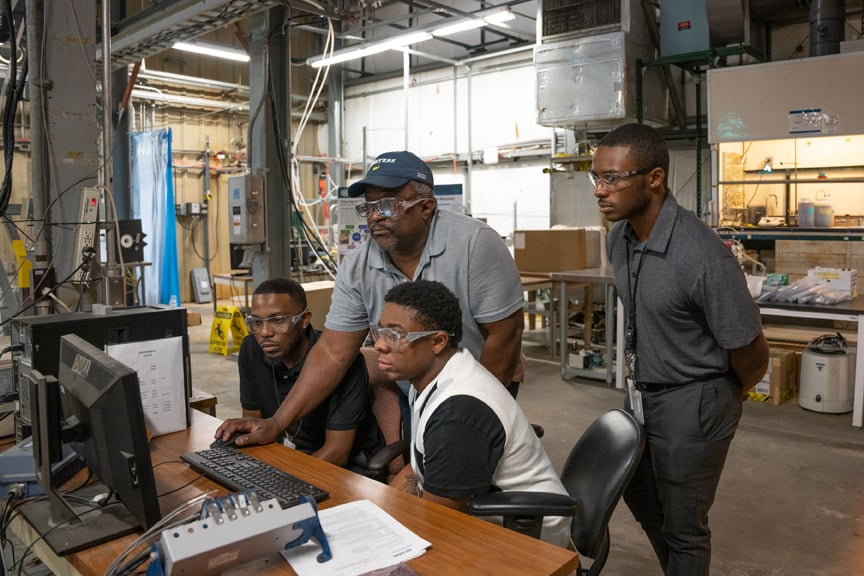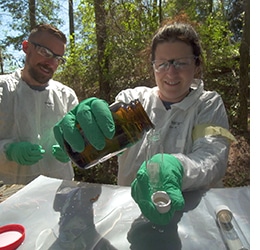Internships and Research Participant Programs
Internships and Academic Opportunities
SRNL hosts numerous internships throughout the year for a variety of disciplines and they are posted on the Open Positions page. Other Scientific Internship Opportunities can be found here.
Undergraduate and graduate internships focus on research in SRNL program areas of national security, environmental stewardship, clean energy, and science and technology.

Internships at SRNL provide:
- Networking with professionals in the fields of national security, clean energy, environmental stewardship, or science and technology.
- Networking with students from other colleges and universities.
- Development of soft skills needed to succeed in a professional research environment.
- Confirmation of academic major and career goals.
Eligibility and Criteria:
- Must be a U.S. Citizen
- Must be a full-time student at an accredited four-year college/university
Opportunities Available in a Wide Range of Academic Disciplines
- Computer Science
- Cybersecurity
- Material Science
- Physical Sciences
- Life Sciences
- Engineering
- And Many More!
Mentorship matters at SRNL! All SRNL interns are paired with a dedicated mentor to support and guide the student during their internship experience.
Specific Internship program opportunities
Office of Science, Workforce Development for Teachers and Scientists Internships

SULI Program Description
The U.S. Department of Energy’s (DOE) Science Undergraduate Laboratory Internship (SULI) program encourages undergraduates from two- and four-year colleges to pursue STEM careers by providing research internships.
Applications are solicited annually for three separate internship terms. Internships last 10 weeks during the summer term (May through August) and 16 weeks during the fall (August through December) and spring (January through May) terms.
The SULI program is sponsored and managed by the DOE Office of Science’s Office of Workforce Development for Teachers and Scientists (WDTS) in collaboration with the DOE national laboratories. To apply to SULI Internships visit: https://science.osti.gov/wdts/suli
The Community College Internship (CCI) Program Description
The Community College Internship program seeks to encourage community college students to enter technical careers relevant to the U.S. Department of Energy (DOE) mission by providing 10-week internships.
Under the guidance of laboratory staff scientists or engineers, SRNL CCI interns work in SRNL research laboratory facilities supporting DOE’s ongoing research and development programs.
The CCI program is sponsored and managed by the DOE Office of Science’s Office of Workforce Development for Teachers and Scientists (WDTS) in collaboration with DOE national laboratories. Applications for the CCI program are solicited annually for the 10-week summer term. CCI internships may also be offered during the fall and spring terms. The fall and spring terms also offer a 16-week flexible schedule option. To apply to CCI Internships visit: https://science.osti.gov/wdts/cci
Graduate Student Research (SCGSR)
The U.S. Department of Energy (DOE) Office of Science Graduate Student Research (SCGSR) program prepares doctoral students for career success in areas supporting the Office of Science’s mission: to deliver scientific discoveries and tools that transform our understanding of nature, and to advance the country’s energy, economic and national security missions, as well as the SRNL missions of Environmental Management, National and Homeland Security, and Energy Security.
The SCGSR program is sponsored by the Office of Workforce Development for Teachers and Scientists and selected candidates can spend three to 12 consecutive months performing research towards their theses at a DOE laboratory or facility in collaboration with a DOE researcher. For detailed SCGSR program information visit: https://science.osti.gov/wdts/scgsr

Visiting Faculty Program Description
The Visiting Faculty Program (VFP) seeks to increase the research competitiveness of faculty members and their students at institutions historically underrepresented in the research community in order to expand the workforce vital to the Department of Energy (DOE) mission areas. As part of the program, selected university/college faculty members collaborate with DOE laboratory research staff on a research project of mutual interest. Faculty member participants may invite up to two students — one of which may be a graduate student — to participate in the research project.
The Visiting Faculty Program is sponsored and managed by the DOE Office of Science’s Office of Workforce Development for Teachers and Scientists (WDTS) in collaboration with DOE laboratories. For VFP information please visit: https://science.osti.gov/wdts/vfp
Applications for the VFP are solicited annually for appointments to the Summer Term (May through August), which is 10 weeks in duration. Each of the 15 participating DOE laboratories offer different research opportunities (not all laboratories participate) and interested faculty members are encouraged to contact DOE laboratory scientists in advance to discuss research projects of mutual interest. Student participation is optional.
All VFP faculty applicants must submit a research project proposal co-developed with the collaborating SRNL research staff at time of application. Proposal guidance and requirements can be found at http://science.energy.gov/wdts/vfp/how-to-apply/developing-a-research-proposal
Minority Serving Institution Partnership Program
The Minority Serving Institutions Partnership Program (EM MSIPP) promotes the education and development of the next generation workforce in critical science, engineering, technology, and math (STEM) related disciplines that compliment current and future missions of The U.S. Department of Energy Office of Environmental Management (DOE-EM).
DOE-EM recognizes that successfully completing its legacy environmental cleanup mission requires maintaining a highly-trained, technically skilled, and diverse workforce. Minority representation in critical science and engineering fields is an important part of EM’s vision for this future workforce.
Applications for the VFP are solicited annually for appointments to the Summer Term (May through August), which is 10 weeks in duration. Each of the 15 participating DOE laboratories offer different research opportunities (not all laboratories participate) and interested faculty members are encouraged to contact DOE laboratory scientists in advance to discuss research projects of mutual interest. Student participation is optional.
EM-MSIPP provides students and graduates of Minority Serving Institutions (MSIs) with hands-on education and experience by supporting collaborations between MSIs and DOE national laboratories. According to The U.S. Department of Education, MSIs are institutions in which one minority group constitutes at least 25% of total undergraduate enrollment, or in which all minority students constitute at least 50% of the total undergraduate enrollment.
Housing And Transportation
Housing
Several options, including the University of South Carolina Aiken dormitory housing, apartment rentals and short-term rentals are available in the local community. Interns and research program participants are responsible for selecting, securing, and payment of their housing selection.
Dormitory Housing at the University of South Carolina Aiken Campus
Many students choose to stay at the student dormitories at the University of South Carolina Aiken campus, which is approximately 20-25 minutes from SRNL. Housing at the dormitories is available from mid-May through the end of July. Interns staying past July must select additional housing options to cover their last internship days at SRNL after dorm housing closes for the summer. Please visit the dormitory web site for exact housing availability dates and pricing at: www.usca.ed/housing
Apartment/Home Rentals
Some interns and research participants choose to live in apartments. If you prefer to sublet a private apartment or room in a house, the closest cities to the lab are Aiken, South Carolina, North Augusta, South Carolina, and Augusta, Georgia.
Transportation
Public transportation is not available, so interns and research participants must have their own transportation to and from SRNL. Many interns do choose to carpool after they arrive and connect with other interns.
For more information contact:
Valarie H. Preddy
SRNL Internship Program Lead
Valarie.Preddy@srnl.doe.gov or ResearchInnovations@srnl.doe.gov